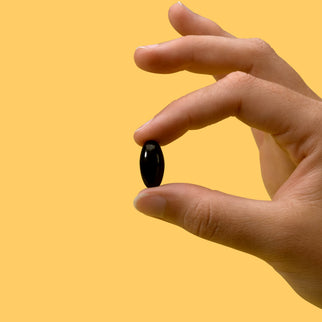Concentration plays a major role when studying and taking exams. It's the cornerstone of academic success, and the key to knowledge and understanding.
As students, the ability to focus, hone in on the task at hand, and absorb information effectively, is crucial for performance in studies and exams — but concentration can often be easier said than done.
Many students have trouble maintaining their focus and may find their minds wandering. So, today, we’re going to explore concentration, talk about some of the common factors that impact it, and offer a few ways to support your focus.
What Is Concentration?
Concentration, in the realm of cognitive science, refers to the act of focusing your mental energy and attention on a specific task or subject.
The mental processes behind concentration involve a pretty complex interplay of various cognitive functions, like attention, memory, and executive functions, all working together to help us keep our focus, filter out irrelevant information, and switch our attention as needed.
To put it simply: concentration allows us to navigate the world around us, absorb new information, and perform tasks effectively.
Why Is It Important for Studies and Exams?
The role of concentration when studying or taking an exam cannot be overstated. Without concentration, the process of learning would be like trying to fill a bucket with a hole in the bottom. Information would flow in one ear and out the other, never truly being absorbed or understood.
Moreover, concentration is crucial during exams — it allows students to effectively recall the information they've learned, understand and interpret the questions being asked, and formulate coherent, well-structured responses. It's the difference between being able to apply your knowledge effectively under exam conditions and falling prey to stress and confusion.
In many ways, concentration is the fuel that drives academic success. It's what allows us to learn, understand, and apply knowledge effectively, particularly under the high-pressure conditions of exams.
What Are the Common Factors That Affect Concentration?
While concentration might sound like a simple concept, it's a delicate balance that can be influenced by a variety of different factors. Concentration can be extremely fragile, and even the slightest shift can break it.
Here are just a few examples of factors that can negatively affect your concentration:
Lack of Sleep
Sleep is the body's natural way of rejuvenating and refreshing itself, both physically and mentally. Insufficient sleep can lead to fatigue, sluggish cognitive processing, and a diminished ability to focus.
Stress
High levels of stress can create a constant state of alertness that makes it difficult to concentrate. If you’re dealing with stressful situations, it’s important to manage those stress levels in order to maintain your overall wellness.
Poor Nutrition or Hydration
Our brains need a steady supply of nutrients to function optimally. A diet lacking in essential vitamins and minerals can affect cognitive functions, including concentration. Even mild dehydration can also impact brain function — water plays a crucial role in delivering nutrients to the brain and removing toxins, and inadequate water intake can interfere with brain processes.
Lack of Physical Activity
Regular exercise increases blood flow to the brain, working to improve and support overall cognitive function and focus. A sedentary lifestyle can lead to lethargy and a decline in concentration.
Environmental Distractions
A noisy or cluttered environment can make it challenging to focus. Our brains are wired to respond to stimuli, so the more distractions there are, the harder it may be to concentrate. A clean, organized workspace can help you maintain your concentration.
Lack of Interest
It's naturally more challenging to concentrate on something that doesn't engage or interest us. When we're not motivated or invested in what we're doing, our minds are more likely to wander.
How Can You Support Your Concentration When Studying?
Improving concentration often requires a holistic wellness approach featuring several lifestyle changes and the use of certain studying techniques. Here are 15 tips that may help to enhance your focus:
1. Create a Study Schedule
A well-planned study schedule can help you manage your time effectively, reducing the stress of last-minute cramming. It allows you to designate specific time blocks for each subject, helping your brain to anticipate and prepare for focused learning. Remember to keep your schedule flexible and include a little time for relaxation.
2. Maintain a Healthy Diet
Proper nutrition is crucial for brain function. A balanced diet rich in fruits, vegetables, whole grains, and lean proteins provides the essential nutrients your brain needs to perform optimally. At the same time, do your best to limit processed foods, fried foods, and foods with artificial sweeteners, as these can have a negative impact on your focus.
3. Get Regular Exercise
Regular physical activity boosts blood flow to the brain, enhancing cognitive abilities and improving mood. Activities like walking, cycling, or yoga can help clear your mind, reduce stress, and improve your ability to concentrate. Aim for at least 30 minutes of exercise a day for the best results.
4. Stay Hydrated
Dehydration can impair cognitive function, leading to difficulties in focusing. Drinking plenty of water throughout the day ensures your brain has the hydration it needs to function properly. Aim for at least eight glasses of water a day, and remember that fruits and vegetables also contribute to your hydration levels.
5. Practice Mindfulness
Mindfulness exercises, such as meditation or deep breathing, can enhance your ability to focus and reduce stress. By training your brain to focus on the present moment, you can improve your concentration and create a peaceful mind space for effective studying. Start with a few minutes each day and gradually increase the duration.
6. Break Down Large Tasks
Tackling a large task all at once can be overwhelming and can hinder concentration. Instead, try breaking tasks down into smaller, manageable parts. This can make each task seem less daunting and allow you to focus on one portion at a time, enhancing your effectiveness and productivity.
7. Take Regular Breaks
Studying for extended periods without breaks can lead to mental fatigue, reducing your ability to concentrate. Taking short, regular breaks can help refresh your mind and maintain a consistent level of focus. A 5 to 10-minute break every hour is usually effective.
8. Try the Pomodoro Technique
Speaking of breaks, the Pomodoro time-management technique involves studying for 25 minutes, then taking a five-minute break. The short, focused study periods followed by brief breaks can enhance your concentration and prevent burnout. Plus, it's a great way to track your study time.
9. Create a Distraction-Free Study Environment
A calm, quiet, and organized study space can significantly improve your ability to concentrate. Try to minimize potential distractions, such as noisy roommates or mobile devices. A clean, well-lit space with all your study materials at hand can also help keep your focus sharp.
10. Get Plenty of Sleep
Adequate sleep is essential for cognitive functions, including memory, attention, and concentration — aim for seven to nine hours of quality sleep each night. Remember, pulling all-nighters can do more harm than good, as sleep deprivation can impair your ability to focus and retain information.
11. Limit Screen Time
Spending long hours in front of digital screens can lead to eye strain and mental fatigue, both of which can impair concentration. Try to balance your screen time with off-screen activities, and take frequent breaks to rest your eyes and mind. Consider using apps that block distracting websites or limit the time you spend on certain sites.
12. Use Supplements
Taking daily supplements of substances like omega-3 fatty acids, particularly DHA and EPA, plays a crucial role in brain health. Omega-3s are integral components of the brain's cell membranes and may have antioxidant effects, which can help maintain overall brain health and function. Here at iwi life, our plant-based omega-3 supplements are derived from sustainably farmedNannochloropsis algae, providing a rich source of these beneficial fatty acids.
13. Practice Deep Work
Deep work refers to periods of intense focus without distractions — it's about immersing yourself in a task and giving it your full attention. This practice can help improve your ability to concentrate, enhance your productivity, and deepen your understanding of complex topics.
14. Avoid Multitasking
Though it might seem efficient, multitasking can actually decrease productivity and impair concentration. Focusing on one task at a time allows for deeper engagement and better retention of information. Try to complete one task before moving on to the next.
15. Stay Organized
An organized study space can reduce stress and make studying more efficient, enhancing your ability to concentrate. Keep your notes, textbooks, and other study materials tidy and easily accessible. Using digital tools like calendars or task management apps can also help manage your study schedule and deadlines.
The Takeaway
Realistically, improving concentration is multi-faceted, requiring a blend of healthy lifestyle habits and effective study techniques. Each of these strategies plays a crucial role in supporting your focus and enhancing cognitive function.
Supplementing these strategies with nutritional supplements, likeiwi life's plant-based omega-3, can provide the essential nutrients your brain needs to function — further supporting your concentration and overall cognitive health.
To give your brain an extra boost, consider incorporating our Brain supplement into your routine. It's designed to support your brain health, providing you with the nutritional support you need to study more effectively and reach your full academic potential.
Sources:
How Concentration Shields Against Distraction | PMC
Improve Your Concentration | Oregon State Academic Success Center
The Hydration Equation: Update on Water Balance and Cognitive Performance | PMC
4 Steps To Improve Your Focus With Mindfulness | Forbes
The Pomodoro Technique: An Effective Time Management Tool | NICHD Connection
How Does Lack of Sleep Affect Cognitive Impairment? | Sleep Foundation
Why Multitasking Doesn’t Work | Cleveland Clinic



















